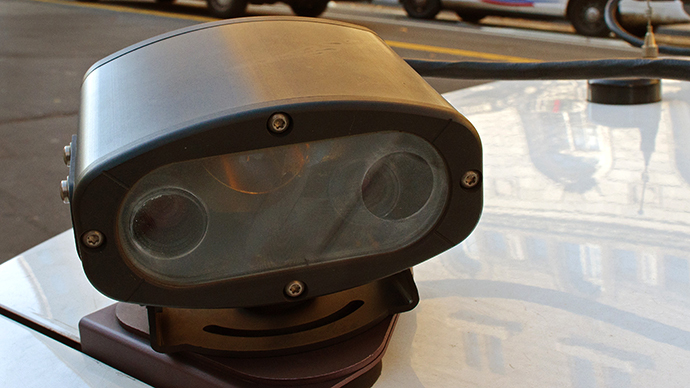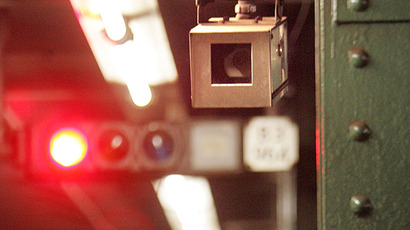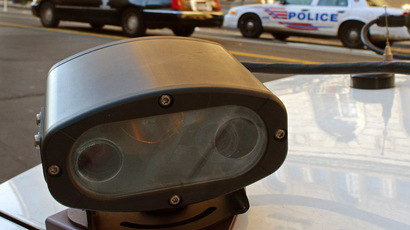Surveillance companies want Utah to stop enforcing privacy-protection law

A privacy law passed in Utah last year limits the use of license plate readers and aims to keep the data collected by them from being abused; now two surveillance companies that sell those scanners are suing the state for alleged free-speech infringement.
The two companies — California’s Vigilant Solutions and Digital Recognition Network (DRN) of Texas — filed the lawsuit in Utah federal court on Thursday and asked a judge there for a permanent injunction against last year’s law.
When the legislation was signed by Governor Gary Herbert last April, it imposed restrictions on how the high-tech surveillance tools can be used across the state, essentially abolishing the sale and use of license plate readers by private companies while also putting limits on how long government entities can store the data collected by those devices.
License plate readers, or LPRs, can photograph upwards of 60 cars-per-second and then match that data with details stored in a list that contains the tags registered to criminals or ones ordered for repossession. A handful of states have passed laws putting limits on these devices, though, often by claiming that collecting this information for extended amounts of time allows anyone with ownership of it to pry into the personal lives of others.
“A person who knows all of another’s travels can deduce whether he is a weekly church goer, a heavy drinker, a regular at the gym, an unfaithful husband, an outpatient receiving medical treatment, an associate of particular individuals or political groups — and not just one such fact about a person, but all such facts,” the US Court of Appeals for the DC Circuit ruled in 2010.
When State Sen. Todd Weiler (R-Woods Cross) proposed the privacy bill, S.B. 196, last February, he asked that the state stop private companies from collecting this information and that the government be forced to give up the data after 90 days.
"I don't want to stop catching criminals,” he said before committee at the time. “I do want to put a tighter lid on the data being harvested.”
But just one year later, that state law has been brought into the crosshairs of two private surveillance companies that say their right to free speech should cancel out the limits imposed by Weiler’s act.
The suit — filed against both Gov. Gary Herbert and Utah Attorney General Sean Reyes — says a court must intervene and place an injunction against Weiler’s law because the First Amendment of the US Constitution allows for photography in public space — and that, they say, is essentially what the LPRs do.
“Taking and distributing a photograph is an act that is fully protected by the First Amendment,” Michael Carvin, an outside counsel for Vigilant, said in a statement this week. “The state of Utah cannot claim that photographing a license plate violates privacy.”
“License plates are public by nature and contain no sensitive or private information,” Carvin continued. “Any citizen of Utah can walk outside and photograph anything they please, including a license plate.”
Sen. Weiler told the Associated Press this week that his idea of photography doesn’t quite match up with that of the attorneys who are asking for an injunction.
"It's one thing to take a photo," he told the AP. "It's another to take photos every 80th of a millisecond, and then store that data you can later be identified by."
"I’m befuddled with that being speech," Weiler told reporters at Ars Technica when they approached him for comment this week. "As you know, this technology... can cut through fog, it can see in the dark, it’s very invasive — it doesn’t matter if you’re going 80 mph. It’s not just a photograph, it’s the direction of travel, time and GPS location. If it was just pictures, nobody would buy it. I think it’s an invasion of privacy. This technology is very intrusive, and I don’t think you can argue with a straight face that this is the same thing as taking a picture of a car.”
When Weiler first proposed his bill last April, the state office of the American Civil Liberties Union lauded his effort while at the same time saying, ideally, they’d want retention periods trimmed down from 90 days to 12 hours. Five months later in July, the ACLU published a 37-page report advocating other lawmakers to propose limits on LPRs.
“The implementation of automatic license plate readers poses serious privacy and other civil liberties threats,” the report read. “More and more cameras, longer retention periods and widespread sharing allow law enforcement agents to assemble the individual puzzle pieces of where we have been over time into a single, high-resolution image of our lives. The knowledge that one is subject to constant monitoring can chill the exercise of our cherished rights to free speech and association.”
Ironically, journalist Paul Nelson of Utah’s KSL news network, reported on Friday that DRN founder Todd Hodnett plans to cite past arguments made by the ACLU in pushing for the court to acknowledge the alleged free-speech infringement brought on by Weiler’s law.
“They assert that when in public spaces, where you are lawfully present, you have the right to photograph anything that’s in plain view. That includes a picture of a federal building, a transportation facility and police,” he told the network.
Hodnett also insisted to KSL that the Utah law “has already had a significant monetary impact on our corporation and our shareholders.” Their lawsuit acknowledges that tow truck owners and repossession businesses in the state can no longer acquires DNR’s services under Weiler law. Prior to its passage, he said, DRN sold a total of 10 LPR camera kits to five private businesses there.
According to his lawsuit, Weiler’s legislation serves little purpose.
“The State does not have a substantial interest in preventing persons from viewing or photographing license plates—or from disseminating the information collected when doing so—because license plates contain no private information whatsoever," it reads in part. "Moreover, the photographic recording of government-mandated public license plates does not infringe any 'privacy' interest that concededly is not infringed when the photographer views the plate. Thus, the State cannot carry its heavy burden to demonstrate that it has a substantial interest that is served by the Act."
"The law restricts the collection and use of data with an ‘Automatic license plate reader system,’" Fred Cate, a law professor at Indiana University, added to Ars Technica’s report. "The restriction on collecting data might conceivably pass First Amendment scrutiny, but not the ban on using the data. I think it is very likely that a court will strike that down."
"Whether such laws are ultimately upheld or ruled unconstitutional will have a huge impact on whether more comprehensive privacy regulations are enacted and what they will look like," Penn State University law professor Clark Asay opined to Ars.
According to their report, Sen. Weiler is currently engaged with the ACLU on a plan that would revise the current law and “may negate” this week’s lawsuit if approved.
Only five states in the US had laws limit LPR use at the time of last year’s ACLU report, but 14 are currently considering similar proposals.














